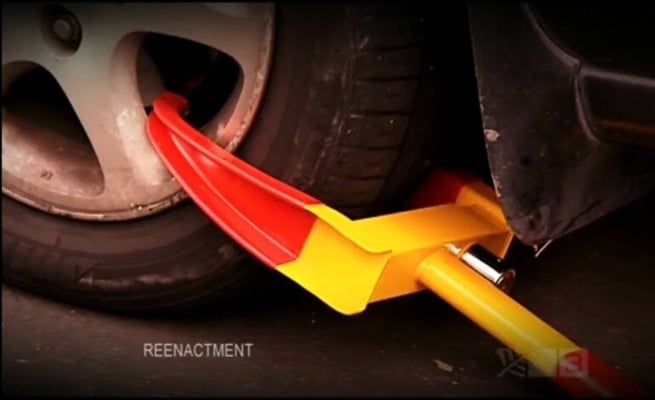Govt puts $100 cap on wheel clamping fee as new rules come into effect

Consumers have been advised to not to pay more than $100 as new rules on wheel clamping comes into effect from Tuesday, January 28.
A recent amendment into Land Transport Bill passed in November 2019 has made wheel clamping companies to comply with the cap of charging $100 for clamping vehicles parked on private properties.
Failing to play by the new rules, the violators may face infringements of up to $1000 for an individual or $5000 for a company.
“Before the law change, wheel clampers could charge any fee they liked. Fees of $200 were common and in some cases were much higher than that. The new law makes it an offence for wheel clampers to charge more than $100,” AA Principal Advisor Regulations Mark Stockdale said.
The AA and Consumer NZ had long advocated for regulating the private parking sector, including wheel clamping, and are pleased to see this new law introduced.
Both organisations have received numerous complaints over many years from motorists about the excessive clamping fees charged, often when the driver only stopped for a few minutes or was unaware parking was not permitted due to unclear or ambiguous signage.
“If the law change fails to put a stop to the cowboy practices of clampers, a ban on wheel clamping would need to be next step,” Consumer NZ Head of Research Jessica Wilson said.
The AA and Consumer NZ advise any motorist, that if they are wheel clamped, and the fee to release the clamp is more than $100, remind the operator of the new law and if they still ask you to pay more, then contact Police on www.police.govt.nz/use-105, or phone the non-emergency 105 number.
Wheel clamping companies can be fined up to $15,000 for breaching the law, Ms Wilson said.
A victim of rampant clamping charges said the new rules to bar the clamping firms from overcharging vehicle owners is a big relief and was long due.
“I was in Otahuhu about a year ago and was off for five minutes to buy lunch, and when I returned, my vehicle was clamped and charged $200 for being away for five minutes.
“Almost similar incident happened to my colleague when he was there for a meeting that too on the parking space of the visiting company, but his vehicle was clamped and later released after a long argument and with the interference of the office on that property,” the victims told The Indian Weekender.
The AA and Consumer NZ encourage the owners of off-street parking to ensure there are plainly visible, illuminated signs that clearly explain who is permitted to park, or basic parking controls like chain-link fences, to reduce the need for wheel clamping in the first place.
“If the parking rules are too complex, or not highly visible, then there will continue to be non-compliance, and it’s not fair that motorists should continue to be penalised for that,” Mr Stockdale said.
Consumers have been advised to not to pay more than $100 as new rules on wheel clamping comes into effect from Tuesday, January 28.
A recent amendment into Land Transport Bill passed in November 2019 has made wheel clamping companies to comply with the cap of charging $100 for clamping vehicles...
Consumers have been advised to not to pay more than $100 as new rules on wheel clamping comes into effect from Tuesday, January 28.
A recent amendment into Land Transport Bill passed in November 2019 has made wheel clamping companies to comply with the cap of charging $100 for clamping vehicles parked on private properties.
Failing to play by the new rules, the violators may face infringements of up to $1000 for an individual or $5000 for a company.
“Before the law change, wheel clampers could charge any fee they liked. Fees of $200 were common and in some cases were much higher than that. The new law makes it an offence for wheel clampers to charge more than $100,” AA Principal Advisor Regulations Mark Stockdale said.
The AA and Consumer NZ had long advocated for regulating the private parking sector, including wheel clamping, and are pleased to see this new law introduced.
Both organisations have received numerous complaints over many years from motorists about the excessive clamping fees charged, often when the driver only stopped for a few minutes or was unaware parking was not permitted due to unclear or ambiguous signage.
“If the law change fails to put a stop to the cowboy practices of clampers, a ban on wheel clamping would need to be next step,” Consumer NZ Head of Research Jessica Wilson said.
The AA and Consumer NZ advise any motorist, that if they are wheel clamped, and the fee to release the clamp is more than $100, remind the operator of the new law and if they still ask you to pay more, then contact Police on www.police.govt.nz/use-105, or phone the non-emergency 105 number.
Wheel clamping companies can be fined up to $15,000 for breaching the law, Ms Wilson said.
A victim of rampant clamping charges said the new rules to bar the clamping firms from overcharging vehicle owners is a big relief and was long due.
“I was in Otahuhu about a year ago and was off for five minutes to buy lunch, and when I returned, my vehicle was clamped and charged $200 for being away for five minutes.
“Almost similar incident happened to my colleague when he was there for a meeting that too on the parking space of the visiting company, but his vehicle was clamped and later released after a long argument and with the interference of the office on that property,” the victims told The Indian Weekender.
The AA and Consumer NZ encourage the owners of off-street parking to ensure there are plainly visible, illuminated signs that clearly explain who is permitted to park, or basic parking controls like chain-link fences, to reduce the need for wheel clamping in the first place.
“If the parking rules are too complex, or not highly visible, then there will continue to be non-compliance, and it’s not fair that motorists should continue to be penalised for that,” Mr Stockdale said.









Leave a Comment